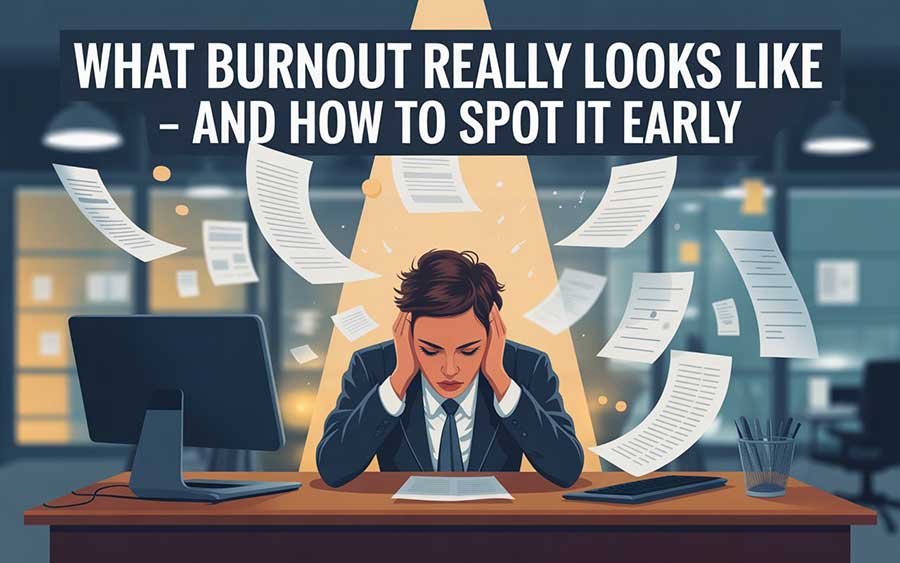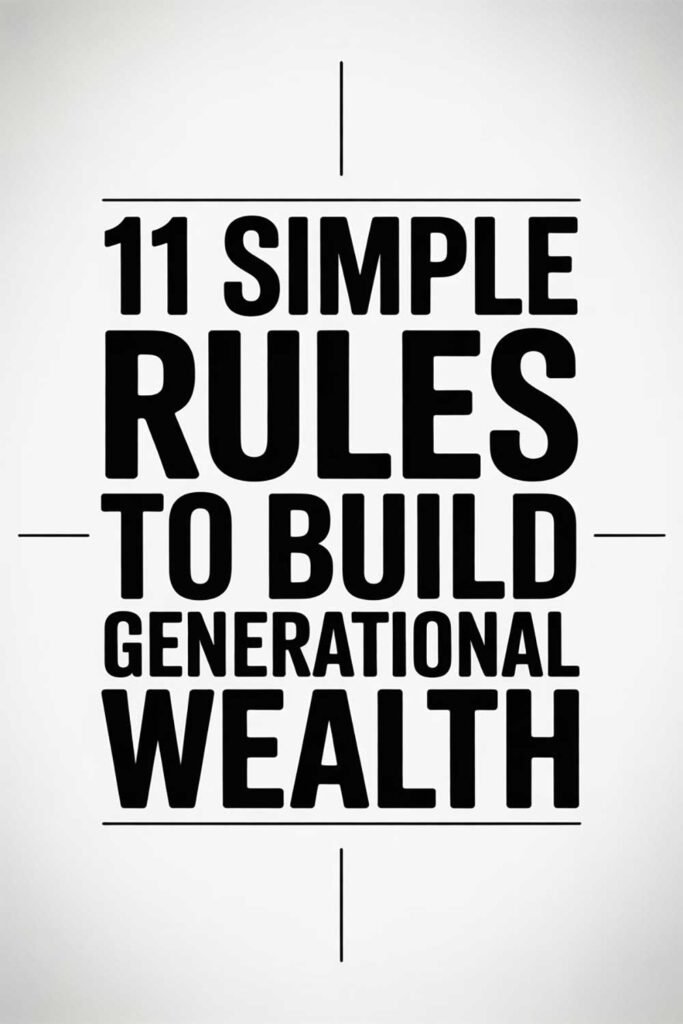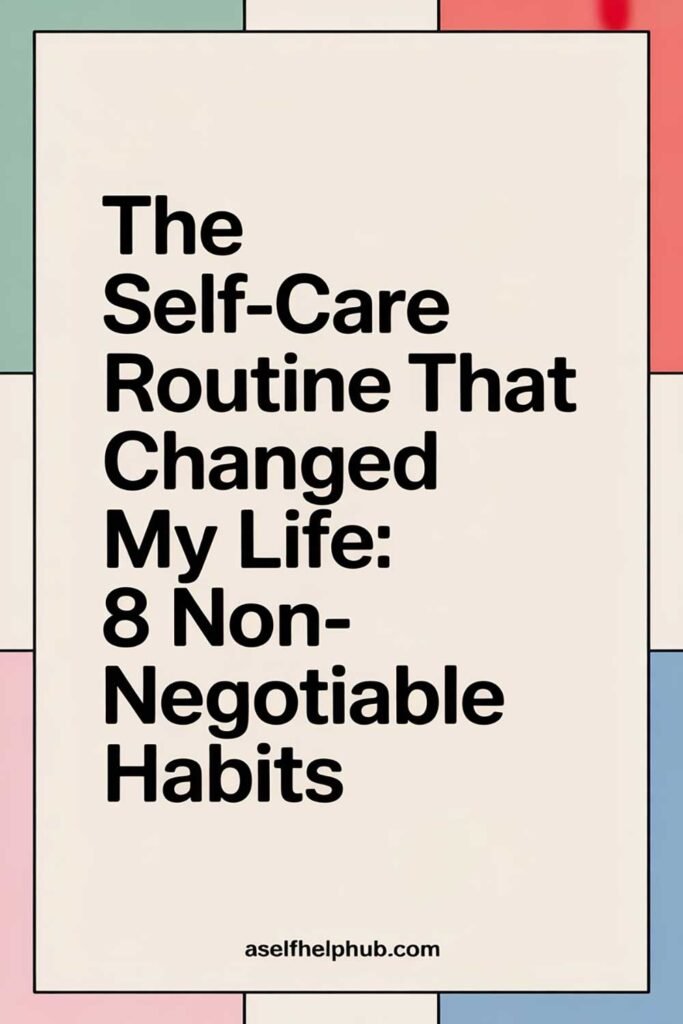
What Burnout Really Looks Like – And How to Spot It Early: Reclaiming Your Vitality
In our driven, always-on society, feeling tired, stressed, or overworked has become a badge of honor for some, a necessary evil for others. But there’s a critical line between being busy and being burned out. Burnout isn’t just extreme exhaustion; it’s a state of chronic stress that leads to physical, emotional, and mental depletion, often accompanied by a sense of cynicism, detachment, and reduced personal accomplishment. It’s a pervasive condition that chips away at your well-being, productivity, and overall quality of life.

For too long, I dismissed my own symptoms as just “being busy” or “needing a vacation.” I pushed through the fatigue, ignored the growing cynicism, and convinced myself that more effort was the answer. But burnout doesn’t respond to more effort; it demands a fundamental shift in how you live and work. The insidious nature of burnout is that it creeps up slowly, making it hard to recognize until you’re already deep in its grip. That’s why understanding its true face and learning to spot its early warning signs is absolutely crucial for self-preservation.
This article will pull back the curtain on what burnout really looks like beyond just feeling tired, sharing the subtle and not-so-subtle indicators to help you identify it early and take corrective action before it completely overtakes your life.
The Spectrum of Stress: From Busy to Burned Out
It’s important to differentiate between normal stress, overwork, and burnout.
- Stress: A temporary feeling of being overwhelmed or under pressure, often related to specific demands. It usually resolves when the demands ease.
- Overwork: Consistently putting in long hours or managing a heavy workload. While tiring, you can still find joy and satisfaction, and your efforts generally yield results. You might feel tired but not completely depleted.
- Burnout: A prolonged response to chronic stress, characterized by three key dimensions defined by the World Health Organization:
- Feelings of energy depletion or exhaustion: Far beyond normal tiredness.
- Increased mental distance from one’s job, or feelings of negativism or cynicism related to one’s job:A sense of detachment, jadedness, or resentment.
- Reduced professional efficacy: A decline in performance or a feeling of being ineffective, even in tasks you once excelled at.
Burnout doesn’t just happen at work; it can occur in any role where you experience chronic stress, such as caregiving, parenting, or even intense volunteer work.
What Burnout Really Looks Like: Beyond Just Being Tired
Here are the often-missed, nuanced signs of burnout that go deeper than surface-level fatigue:
1. Profound Exhaustion That Sleep Doesn’t Fix
This isn’t just needing a nap. This is waking up tired, even after 8 hours of sleep. It’s a persistent, bone-deep weariness that a weekend off doesn’t alleviate. It impacts both your physical and cognitive functions.
- How it feels: Your body feels heavy. Your brain feels foggy. Even simple tasks like grocery shopping or holding a conversation feel like monumental efforts. You might start relying heavily on caffeine just to function.
- Real-Life Example: Sarah, a young professional, used to power through her days with high energy. Gradually, she found herself hitting snooze multiple times, dragging herself out of bed, and feeling utterly drained by lunchtime. Even on vacation, she felt too tired to truly enjoy herself. She thought she just needed more sleep, but the exhaustion was relentless, signaling a deeper issue than simple fatigue.
2. Pervasive Cynicism and Detachment
This is the emotional toll. You might become increasingly negative, irritable, or cynical towards your work, your colleagues, or your responsibilities. It feels like a protective emotional shell.
- How it feels: A loss of enthusiasm for tasks you once enjoyed. You might start seeing clients, colleagues, or family members as burdens. Your empathy wanes. You might find yourself complaining constantly or feeling apathetic.
- Real-Life Example: Mark, a dedicated teacher, loved his students and found joy in planning lessons. Slowly, he noticed he was dreading going to school, snapping at students over minor issues, and feeling a deep resentment towards administrative tasks. The passion that once fueled him had been replaced by a bitter cynicism he couldn’t shake, making it hard to find meaning in his work.
3. Reduced Sense of Accomplishment (Even When You’re Achieving)
Despite putting in long hours, you feel like you’re not making a difference, or that your efforts are futile. This impacts your motivation and self-esteem.
- How it feels: You might complete a major project but feel no satisfaction. You doubt your capabilities and feel ineffective, even when objectively successful. A sense of futility or “what’s the point?” settles in.
- Real-Life Example: Maria, a high-achieving lawyer, successfully won several complex cases, a feat she once would have celebrated. Instead, she felt numb, questioning if her work truly mattered or if she was even good enough. The wins felt hollow, and she couldn’t shake the feeling that she was underperforming, despite evidence to the contrary. This often happens when you push yourself to the point where even side hustle hacks: how to start earning without burnout becomes difficult or unrewarding.
4. Increased Irritability and Impatience
Your emotional fuse shortens dramatically. Minor annoyances feel like major affronts, and you might snap at loved ones or colleagues more frequently.
- How it feels: You have less patience for small talk, interruptions, or anything that doesn’t go exactly as planned. You might feel constantly on edge, ready to explode over trivial matters.
- Real-Life Example: David found himself yelling at his kids for minor spills and getting disproportionately angry at slow drivers. These reactions were completely out of character. He knew something was wrong when his own family started tiptoeing around him, fearing his unpredictable temper.
5. Physical Symptoms Without a Clear Cause
Burnout can manifest physically. Chronic stress takes a toll on your body, even if you’re not consciously aware of the emotional strain.
- How it feels: Frequent headaches, muscle aches (especially neck and shoulders), digestive problems, increased susceptibility to colds/flu, changes in appetite or sleep patterns, unexplained fatigue, heart palpitations.
- Real-Life Example: Emily began experiencing persistent headaches and stomach issues. She visited doctors, but tests found no specific cause. It was only when her therapist pointed out the connection between her unrelenting work schedule and her physical symptoms that she realized her body was screaming for help, even if her mind was trying to push through.
6. Withdrawal and Isolation
You start pulling away from social interactions, hobbies, and activities you once enjoyed, finding even pleasant engagements too draining.
- How it feels: A strong desire to be left alone. You decline social invitations, avoid phone calls, and prefer solitary activities, even if they don’t bring much joy. Your energy to engage with others is simply gone.
- Real-Life Example: Prior to burnout, Michael was the life of the party, always organizing get-togethers. As burnout set in, he started making excuses to avoid friends, stopped pursuing his beloved weekend sports, and spent most of his evenings zoning out in front of the TV. The thought of engaging with anyone felt utterly exhausting.
How to Spot It Early: Your Action Plan
Recognizing these signs early is your superpower. The sooner you intervene, the easier and faster recovery can be.
- Regular Self-Check-ins: Don’t wait until you crash. Schedule brief daily or weekly “sanity checks.” Ask yourself: How do I feel physically? Emotionally? Am I enjoying things? Am I feeling cynical?
- Listen to Your Body: Your body often sends signals before your mind fully registers burnout. Pay attention to persistent aches, digestive issues, or changes in sleep and appetite.
- Monitor Your Emotional Baseline: Notice if your general mood has shifted towards irritability, apathy, or negativity. Are you reacting differently to situations?
- Track Your Energy Levels: Beyond just sleep, how do you feel throughout the day? Do you have sustained energy, or are you running on fumes?
- Seek Objective Feedback: Ask a trusted friend, family member, or colleague, “Have you noticed any changes in me lately?” Sometimes, others see what we’re too close to perceive.
- Review Your Boundaries: Are you saying “yes” too often? Are you taking work home consistently? Burnout often stems from a lack of clear boundaries. Learning how to set boundaries at work to avoid burnout is a vital preventative measure.
- Prioritize Self-Care: If your self-care routine is the first thing to go when you’re busy, that’s a red flag. Self-care isn’t selfish; it’s essential for preventing and recovering from burnout. It’s crucial to learn how to prioritize self-care without feeling selfish.
If you recognize these signs, don’t ignore them. Burnout is not a sign of weakness; it’s a signal that your system is overloaded. Taking proactive steps like creating a sustainable how to create a self-care routine that sticks or exploring diverse self-care practices can begin your journey to recovery and help you self-care for burnout recovery: how to heal and rebuild your energy. Your vitality, your passion, and your sanity depend on it.
20 Empowering Quotes on Burnout, Rest, and Resilience:
- “Burnout is not a sign of weakness; it’s a sign that you’ve been strong for too long.” – Unknown
- “Rest is not idleness, and to lie sometimes on the grass under trees on a summer’s day, listening to the murmur of the water, or watching the clouds float across the sky, is by no means a waste of time.” – John Lubbock
- “You are not a machine. You are a human being, with a need for rest and rejuvenation.” – Unknown
- “Self-care is not selfish. You cannot pour from an empty cup.” – Unknown
- “Almost everything will work again if you unplug it for a few minutes, including you.” – Anne Lamott
- “Burnout is the result of too much output and not enough input.” – Unknown
- “Don’t let the noise of others’ opinions drown out your own inner voice. Especially your inner voice telling you to rest.” – Steve Jobs (adapted)
- “Take care of your body. It’s the only place you have to live.” – Jim Rohn
- “The cure for anything is salt water: sweat, tears, or the sea.” – Isak Dinesen
- “The greatest glory in living lies not in never falling, but in rising every time we fall.” – Nelson Mandela (Applies to recovering from burnout)
- “Sometimes the most productive thing you can do is rest.” – Unknown
- “It’s okay to slow down. It’s okay to say no. Your worth is not determined by your productivity.” – Unknown
- “Burnout is less about the demands placed on us and more about the resources we have to cope with them.” – Dr. Nicole LePera
- “The quieter you become, the more you can hear.” – Ram Dass (Including your body’s signals)
- “Our stress response is designed for acute, not chronic, threats.” – Unknown
- “You can do anything, but not everything.” – David Allen
- “The secret of getting ahead is getting started. The secret of getting started is breaking your complex overwhelming tasks into small manageable tasks, and then starting on the first one.” – Mark Twain (Applies to recovering from burnout, taking small steps)
- “Healing is not linear. It’s okay to have good days and bad days.” – Unknown
- “Boundaries are a form of self-respect.” – Unknown
- “Your energy is your most valuable currency. Invest it wisely.” – Unknown
Picture This
Imagine your personal energy as a deep well. When you’re busy, you’re drawing water to meet demands, and the water level naturally fluctuates. But with burnout, it’s as if there’s a slow, persistent leak at the bottom of the well, and you’re drawing water out faster than it can replenish. No matter how much water you pour in (sleep, weekend rest), the level never truly rises, because the leak is still there. Spotting burnout early is like noticing that leak when it’s just a drip, allowing you to fix it before the well is completely empty and you’re left parched.
Share This Article
Did this article help you understand burnout better? Share it with friends, family, or on social media to help others recognize the signs early and prioritize their well-being!
Disclaimer
This article is intended for informational purposes only and is based on general psychological principles and common experiences. It is not a substitute for professional medical advice, diagnosis, or treatment for clinical burnout, chronic stress, or other mental health conditions. If you are experiencing severe or persistent symptoms of burnout or significant distress, please consult with a qualified healthcare or mental health professional.






